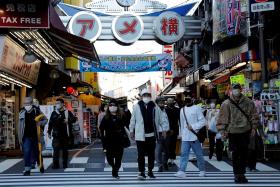Japan’s Emperor Naruhito officially enthroned in lavish ceremony
TOKYO: Japanese Emperor Naruhito formally proclaimed his ascendancy to the throne yesterday in a centuries-old ceremony attended by dignitaries from more than 180 countries, pledging to fulfil his duty as a symbol of the state.
Naruhito became emperor and his wife Masako became empress on May 1 in a brief ceremony, but yesterday's Sokui no Rei was a more elaborate ritual at the royal palace in which he officially announced his change in status to the world.
"I swear that I will act according to the Constitution and fulfil my responsibility as the symbol of the state and of the unity of the people," the 59-year-old declared, his voice slightly hoarse, in front of about 2,000 guests.
The celebrations, for which Japan declared a national holiday, were tempered by Typhoon Hagibis, which killed at least 82 people when it tore through Japan 10 days ago and pouring rain early yesterday.
At the sound of a gong in the Matsu-no-Ma, or Hall of Pine, the most prestigious room in the palace, two courtiers bowed deeply and drew back purple curtains on the Takamikura throne - a 6.5m-high pavilion.
Harvard-educated Empress Masako, 55, wearing heavy 12-layered robes and with hair flowing down her back, stood in front of a smaller throne to the side. Such traditional robes can weigh around 15kg.
Prime Minister Shinzo Abe led a trio of cheers of "banzai", or "long life", for the emperor, before a 21-gun salute.
The government pardoned half a million people convicted of petty crimes, such as traffic violations, to mark the day.
Though many Japanese welcomed the enthronement ceremony, some shrugged it off as a nuisance.
"There is no need for such an elaborate ceremony. Traffic has been restricted and it is causing inconvenience for the people," said Mr Yoshikazu Arai, 74, a retired surgeon. "The emperor is necessary now as a symbol of the people, but at some point, he will no longer be necessary. Things will be just fine without an emperor." - REUTERS
Get The New Paper on your phone with the free TNP app. Download from the Apple App Store or Google Play Store now


